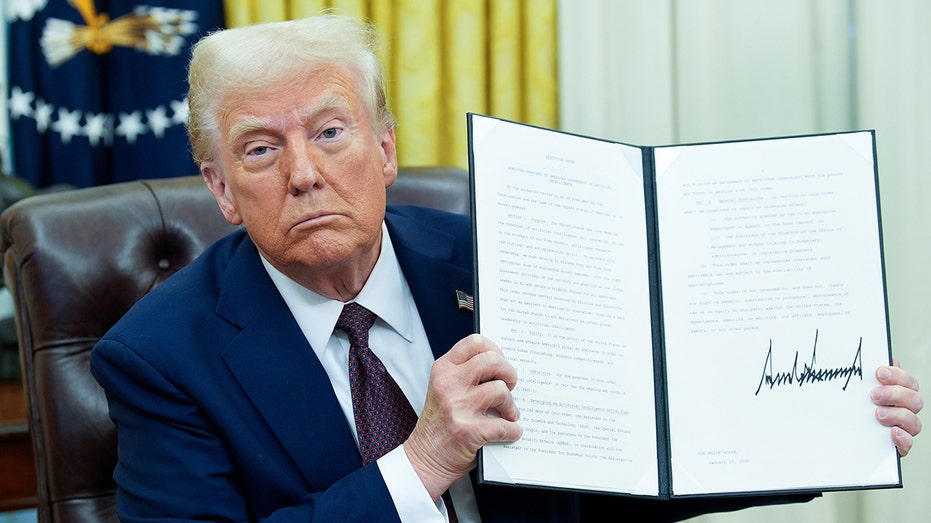The Supreme Court has temporarily allowed President Donald Trump to fire numerous Democrat-appointed members of independent agencies, but one case still moving through the legal system carries the greatest implications yet for a president’s authority to do that.
In Slaughter v. Trump, a Biden-appointed member of the Federal Trade Commission has vowed to fight what she calls her “illegal firing,” setting up a possible scenario in which the case lands before the Supreme Court.
The case would pose the most direct question yet to the justices about where they stand on Humphrey’s Executor v. United States, the nearly century-old decision regarding a president’s power over independent regulatory agencies.
John Shu, a constitutional law expert who served in both Bush administrations, told Fox News Digital he thinks the high court is likely to side with the president if and when the case arrives there.
SUPREME COURT SAYS TRUMP CAN PROCEED WITH FIRING DEMOCRAT-APPOINTED CPSC MEMBERS
“I think it’s unlikely that Humphrey’s Executor survives the Supreme Court, at least in its current form,” Shu said, adding he anticipates the landmark decision will be overturned or “severely narrowed.”
Humphrey’s Executor centered on President Franklin D. Roosevelt’s decision to fire an FTC commissioner with whom he disagreed politically. The case marked the first instance of the Supreme Court limiting a president’s removal power by ruling that Roosevelt overstepped his authority. The court found that presidents could not dismiss FTC commissioners without a reason, such as malfeasance, before their seven-year terms ended, as outlined by Congress in the FTC Act.
However, the FTC’s functions, which largely center on combating anticompetitive business practices, have expanded in the 90 years since Humphrey’s Executor.
“The Federal Trade Commission of 1935 is a lot different than the Federal Trade Commission today,” Shu said.
He noted that today’s FTC can open investigations, issue subpoenas, bring lawsuits, impose financial penalties and more. The FTC now has executive, quasi-legislative and quasi-judicial functions, Shu said.
If the Supreme Court’s decision to temporarily allow two labor board members’ firings is any indication, the high court stands ready to make the FTC less independent and more accountable to Trump.
In a 6-3 order, the Supreme Court cited the “considerable executive power” that the National Labor Relations Board and Merit Systems Protection Board have, saying a president “may remove without cause executive officers who exercise that power on his behalf.”
TRUMP’S CONTROVERSIAL PLAN TO FIRE FEDERAL WORKERS FINDS FAVOR WITH SUPREME COURT
The order did not mention Humphrey’s Executor, but that and other moves indicate the Supreme Court has been chipping away at the 90-year-old ruling and is open to reversing it.
The case of Rebecca Slaughter and Alvaro Bedoya gets closest to the heart of Humphrey’s Executor.
Slaughter enjoyed a short-lived victory when a federal judge in Washington, D.C., found that Trump violated the Constitution and ruled in her favor on July 17.
She was able to return to the FTC for a few days, but the Trump administration appealed the decision and, on July 21, the appellate court paused the lower court judge’s ruling.
Judge Loren AliKhan had said in her summary judgment that Slaughter’s case was almost identical to William Humphrey’s.
SUPREME COURT UPHOLDS TRUMP’S REMOVAL OF BIDEN APPOINTEES FROM FEDERAL BOARDS
“It is not the role of this court to decide the correctness, prudence, or wisdom of the Supreme Court’s decisions—even one from ninety years ago,” AliKhan, a Biden appointee, wrote. “Whatever the Humphrey’s Executor Court may have thought at the time of that decision, this court will not second-guess it now.”
The lawsuit arose from Trump firing Slaughter and Bedoya, the two Democratic-appointed members of the five-member commission. They alleged that Trump defied Humphrey’s Executor by firing them in March without cause in a letter that “nearly word-for-word” mirrored the one Roosevelt sent a century ago.
Bedoya has since resigned, but Slaughter is not backing down from a legal fight in which Trump appears to have the upper hand.
“Like dozens of other federal agencies, the Federal Trade Commission has been protected from presidential politics for nearly a century,” Slaughter said in a statement after she was re-fired. “I’ll continue to fight my illegal firing and see this case through, because part of why Congress created independent agencies is to ensure transparency and accountability.”
Now a three-judge panel comprising two Obama appointees and one Trump appointee is considering a longer-term pause and asked for court filings to be submitted by July 29, meaning the judges could issue their decision soon thereafter.
























